Claude Forthomme's Blog, page 46
May 10, 2013
Trend toward Technology for the One Percent: A New Theme for Science Fiction
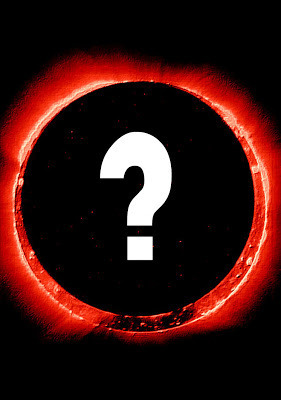
"I glimpsed the future." That's what Jenna Wortham wrote in a recent New York Times article reviewing the new Google Glass, the futuristic computer eyewear that lets you shoot video and read your email. A fascinating new technology but likely to be very expensive (around $1500 when it comes out later this year).
Ms. Wortham wondered whether there was a "trend toward technology for the 1 percent", summing up the Google innovation as "a new leap, but for how many of us?"
The social dimension of technological progress is increasingly coming to the fore, a perfect new theme for Science Fiction.
Add the revolution in literature caused by the rise of Boomer Lit, and an exciting new brand of Science Fiction is born. Boomer concerns - how to address aging and the so-called Third Act in life - are bound to affect Science Fiction and give rise to a new raft of sci-fi stories with a different focus, more socially aware. So the question is: can Boomer Lit that covers so many genres, from romance to fantasy, also extend to Science Fiction?
At first sight, the answer is no: science
fiction is a futuristic genre, set either on this Earth or some other planet. Boomer
Lit is aimed at Baby Boomers and their concerns as they approach retirement age.
Can you imagine boomers as sci-fi heroes, thrown in the future or alternative
times and parallel spaces, struggling with aliens, androids and robots, traveling faster
than light?
Well…I can! Okay, not all of Science Fiction, but the stories that place
aging, love and death front and center. Why? Because science fiction is a
"device" used by writers to "discuss philosophical ideas such as
identity, desire, morality, and social structure" (ref. Wikipedia). And that’s precisely what Boomer Lit does.
The difference between the two? timing. In sci-fi terms, the central Boomer
Lit question becomes: How will our society handle aging in future given
probable technological advances?
Recently, I’ve been haunted by this question - no doubt because, as so many
boomers, I am facing now my own aging (yes, wrinkles threaten!) and I have to
take care of my elderly mother, she will be 100 years old this year. So I began
to dream of a future where medical science had solved the problem of aging, saving
us from the discomforts and diseases of the elderly.
Imagine that: you look young all your life until you drop dead. Perfect
bliss? Or might you be missing out on something?
Being a writer, it is a question I prefer to answer with fiction rather than
philosophy.
Hence the birth of my serial novel 2213:Forever Young.
It’s a safe bet that 200 years from now we’ll
have a fully functioning technology for staying young. And it is also likely
that it will be tremendously expensive. With our current economic system, technical
advances, even when they cost little to produce (like contact lenses or
aspirin), reach the market at very high prices. And stay that way even when the
cost of production has dropped dramatically. Because big corporations (claim they) need to
finance their future research…
With income inequality on the increase worldwide since the 1970s, it is
fairly obvious that we are headed towards a Society characterized by a Great
Divide between the One Percent and the 99 Percent. It is equally obvious that
the technology to stay young will be extremely costly and therefore only the ultra rich will access it.
With what results for the rest of us?
That is what 2213:
Forever Young explores. Can such a book be considered Boomer Lit? I
recently asked the question to my fellow members in our Goodreads Boomer Lit
Group and it sparked an interesting discussion that you can read here.
There were some doubters but most agreed that it probably could.At least one mentioned she had written a story about a rejuvenating pill and its dire consequences.
Questions for you: Can Science Fiction be a sub-genre of Boomer Lit? Do you see the trend toward technology reserved for the One Percent as a new theme for Science Fiction?
PLEASE NOTE THE DOUBLE PROMOTION to celebrate the
publication of Part Two of 2213:Forever Young:
From 10 to 14 May Part One is FREE and Part Two
costs only 99 cents.
Click here
for your free copy of Part One.
Click here for your 99 cents copy of Part Two.
Hurry, the promotion lasts only 5 days
(afterwards, the price returns to its normal level of $1.99)
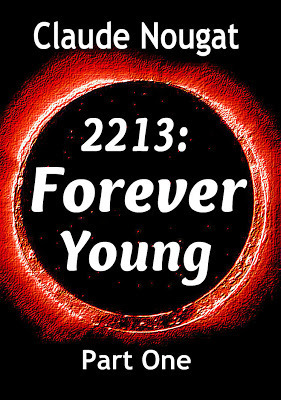
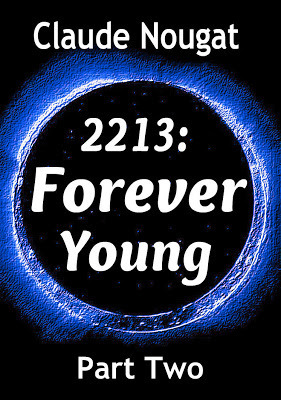
Related articles
 Why Are Women in Old Science Fiction Always Stuck in Tubes?(motherboard.vice.com)
Why Are Women in Old Science Fiction Always Stuck in Tubes?(motherboard.vice.com) Essential Geek Reads: Science Fiction Edition(geeksugar.com)
Essential Geek Reads: Science Fiction Edition(geeksugar.com) Bill for compulsory science fiction in West Virginia schools(guardian.co.uk)
Bill for compulsory science fiction in West Virginia schools(guardian.co.uk) Travel, emergencies, and midlife challenges are the topics for this week's Best of Boomer Blogs(boomersurvive-thriveguide.typepad.com)
Travel, emergencies, and midlife challenges are the topics for this week's Best of Boomer Blogs(boomersurvive-thriveguide.typepad.com)








Published on May 10, 2013 02:43
May 7, 2013
What Makes for a Boomer Lit Masterpiece?
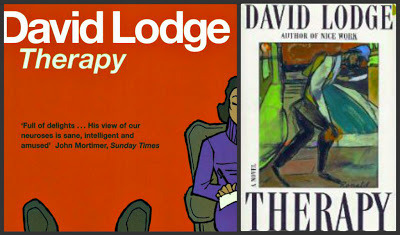
Boomer Lit has two big selling points:
(1) the size of its market, a point recently made in the Huffington Post by Author Dianne Harman who notes that "any time there's a potential audience of 76-79 million people, and you
have to think a lot of them read, that is just huge!" So her advice is:
"if you want to write the next blockbuster book or series, write in the
genre of boomer lit!"
(2) the quality of the books it offers.
I have often blogged about both points, most recently here. This time I'd like to consider the second point - the quality of boomer reads - from a different angle. I just finished an remarkable book, Therapy by David Lodge, recounting the sad-and-funny experiences of a successful fifty-something TV sitcom writer whose wife of many years suddenly abandons him. His life falls apart, he is assailed by an inexplicable mid-life angst and a puzzling knee pain that no amount of acupuncture, aromatherapy, physiotherapy, you-name-it-therapy is able to cure. The book is a classic quest for lost happiness, taking us on an unexpected and unforgettable pilgrimage to Santiago de Compostela in Spain before resolution is found.
David Lodge is one of my favorite authors and along with Malcolm Bradbury, who was his closest writer friend - they're both major exponents of the campus novel genre - he is surely one of the top satirical writers of the 20th century (no, he's not dead yet - look for more masterpieces from him!)
You know what is the most surprising thing about this book? It was first published in 1995! Yes, that's some fifteen years before we started talking earnestly about Boomer Lit, with the creation of a Goodreads Group to discuss Boomer Lit. Yet Therapy is quintessential Boomer Lit. It hits on all the major points that make for a top Boomer Lit read:
- a mature adult protagonist facing a major life transition as his marriage and job unravel;
- a range of challenges that are typically those boomers are facing today;
- coping mechanisms and complex characters that are the result of a lifetime of experience.
The plot and characters are not simple, only a mature writer could have written this with the necessary depth of experience and nuances in sensibilities.
Add to this David Lodge's writing talent and you have a masterpiece, rich with unforgettable character descriptions, surprising twists and turns in the plot and a whole array of thoughtful observations. From a technical point of view, Lodge shows his virtuosity with masterful changes in points of views, each written with a different "voice" to reflect each character.
Some of the reviews on Amazon mention that this is a book about a "mid-life crisis".
But this is not a mere mid-life crisis, it is much more!
Consider the main character, Tubby Passmore (I love the name!). Once he has solved his problems, can he go back to the way everything was before the crisis began? Because that is what the term "mid-life crisis" implies: that you can return to what you were before. The answer is he cannot. Things change in Tubby's life in such a radical way that he is forced to embark on the "Third Act" in his life. And learn to live differently. This is where David Lodge's Therapy is similar to Rachel Joyce's The Unlikely Pilgrimage of Harold Fry: they both throw their main characters on a harrowing quest to find a new self, in short, a picaresque pilgrimage - across England for Harold Fry, to Spain for Tubby Passmore (after he's gone through Tenerife and Copenhagen, yes, I told you, expect some surprising turns!).
This is the fundamental question at the heart of Boomer Lit: who are we? After a lifetime of work, of living with a partner/lover, what is left of oneself when everything that has defined our lives disappears?
The parallel with YA Lit is intriguing, after all, the central question is the same. But the person seeking the answer is at a different stage in life, at the beginning rather than the end...
The question that remains still unanswered is why Boomer Lit, if it started so long ago, has not been recognized as a genre sooner. As I mentioned in an earlier post, it began to gain solid recognition in 2008 among the Big Publishers (Hachette, Simon & Shuster, HarperCollins) and then it stopped. Why? I am not sure but I suspect the digital revolution had something to do with it: it would appear that the first wave of e-books that sold offered the kind of commercial narratives that appealed to a younger, romantic and/or more techie audience. Obviously, if people love romance à la Jane Austen, YA vampires à la Stephanie Meyers and New Adult erotica à la 50 Shades of Grey, they are not going to be reading Boomer Lit. But with time and the spread of the e-book market, this could change.
What is your opinion? Do you feel ready to dive into Boomer Lit? Try David Lodge, if you haven't read him yet. Here's one of the passages most often highlighted by Amazon readers, it is a reflection made by Tubby Passmore as he fights his bouts of melancholy:
"One of the depressing things about depression is knowing that there are
lots of people in the world with far more reason to feel depressed than
you have, and finding that, so far from making you snap out of your
depression, it only makes you despise yourself more and thus feel more
depressed."
Insightful! Tubby Passmore is an unforgettable character...Of course David Lodge has written more books in this vein since - in particular Deaf Sentence published in 2008, reviewed here in the New York Times. But that will be for another blog post!
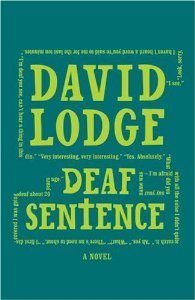 Cover of Deaf Sentence
Cover of Deaf SentenceRelated articles
 Retirement Tips Baby Boomers Should Know About(expertscolumn.com)
Retirement Tips Baby Boomers Should Know About(expertscolumn.com) Why Boomer Lit Sells and What We Can Learn from a Boomer Best Seller(claudenougat.blogspot.com)
Why Boomer Lit Sells and What We Can Learn from a Boomer Best Seller(claudenougat.blogspot.com) Boomer Lit and Big Publishers: a Future Together?(claudenougat.blogspot.com)
Boomer Lit and Big Publishers: a Future Together?(claudenougat.blogspot.com) Therapy for Baby Boomers - Midlife Crisis with Dick and Jane by Nin Andrews(coyotero2112.wordpress.com)
Therapy for Baby Boomers - Midlife Crisis with Dick and Jane by Nin Andrews(coyotero2112.wordpress.com)








Published on May 07, 2013 11:43
May 6, 2013
How To Become a Brand
[image error]
Wondering about what sells books or anything else for that matter? We all know it's "word of mouth", but how do you get the mouths babbling about your book?
The standard answer is that you, as a writer, should become a "brand": everyone will want to read your books once you've established yourself as a brand.
Easier said than done.
Even the marketing experts don't seem to be sure and they fall into two schools of thought, the "why" and the "Dove":
1. The "why" school, as brilliantly explained in this TED talk by Simon Sinek, a notable marketing guru and author of best-selling Start with Why:How Great Leaders Inspire Everyone to Take Action. This is the seventh most viewed video on TED (over 1.6 million views), but since it lasts over an hour you might just have time for the central idea, what Sinek calls the "Golden Circle" explained in the following 5 minute clip from his TED talk:
This is a simple but powerful model for how leaders inspire
action: "what you do" is on the periphery of the circle, "how you do it" comes next and "why you do it" is at the core. The argument is that inspired leaders do more than others: they not only know "what" to do and "how", they also know "why". And base their communication strategy on the "why" rather than on the "what" and "how" as most of us do.
His
examples include Steve Jobs, Martin Luther King, and the Wright brothers -- and as a counterpoint Tivo, which (until a recent court victory that
tripled its stock price) appeared to be struggling mainly because, as Sinek argues, their advertising was directed at what their product does instead of explaining to consumers why they would want to own one.
In contrast, Apple with Steve Jobs at its helm reversed that order and didn't sell people their computers (the "what") but what they believed in (the "why"), with their "think differently" pitch.
Why should this work? Since Apple tells you it thinks outside the box, it evokes enthusiasm for their innovative edge. What they are doing is appealing to emotions rather than reason and as everyone knows, emotions are what drives impulse buying...
So branding is a paradigm shift: you are not buying something ("what"), you are buying "why".
Does this apply to book selling?
Yes, if you are Steve Jobs or Martin Luther King. And no, I'm not being facetious! I'm just pointing out that the whole model proposed by Sinek is based on observing the behavior of people who are already recognized leaders. Are you a leader in your circles/area of expertise etc? If so, selling books, or whatever else you might be producing, will come easy. Indeed, non-fiction authors who are recognized authorities in their field have no trouble selling their books.
It's fiction authors who are in trouble. They are not (necessarily) leaders or celebrities or authorities in their field. So is there another way?
Which takes us to the second school of thought:
2. The "Dove" school, as stunningly demonstrated by DOVE in its Real Beauty Sketches series, a hug success on YouTube (over 13 million viewers!). Here it is:
The New York Times has an interesting write-up about this approach to advertising which, as it delicately put, "shines light on female insecurities", meaning that women tend to worry about how beautiful they really are...
So what's the basic idea? What the Dove Corporation hopes is that the next time you're walking down the aisles of your supermarket looking for a soap or a deodorant, you'll remember that amazing video which, as a woman, was (hopefully) profoundly meaningful to you. You'll associate the name Dove not with a soap that cleans you or a cream that softens your skin but with a bunch of people that worry about you as a human being, that seek to help and understand.
This is again an emotional appeal but of a different kind than the one proposed by Sinek. It doesn't draw attention to a particular person asking us to admire him/her. It draws attention to ourselves, it sheds light on our condition and does this in an unforgettable, striking way.
What are the lessons to be drawn from all this for a fiction writer? In my view, it should be possible to use both schools of thoughts to come up with a two-pronged strategy that could be used for effective book promotion and discoverability:
1. Realize our own limits: a fiction writer is rarely a celebrity or authority which means that telling the "why" one writes may be interesting but it cannot go too far. The risk is that potential readers will view this as narcissistic behavior and could be easily turned off.
2. Use empathy: fiction is a unique way of sharing reality. Indeed, what drives the best fiction is one's own experiences. A writer can shed light on the human condition through his/her novels exactly like the Dove videos "shines light on female insecurities"...
So, in my view, as a writer, you can tell your readers "why" you write but remember to complement it with your own reflections - your "voice" - about the broader human condition. Use empathy, make it clear that the pains the characters in your fiction are going through are deeply known to you because you have suffered them too!
Just my two cents. But I'd love to hear your views: what lessons do YOU draw from the "why" school and the "Dove" school of marketing?
Related articles
 4 tips to help sell a brand(atbunt10.wordpress.com)
4 tips to help sell a brand(atbunt10.wordpress.com) Why Some Things Go Viral And Others Don't(businessinsider.com)
Why Some Things Go Viral And Others Don't(businessinsider.com) Why I Am Not a Brand(belleofthecarnival.com)
Why I Am Not a Brand(belleofthecarnival.com) Applying the "Secret Formula" to Your Blog(bloggingtips.com)
Applying the "Secret Formula" to Your Blog(bloggingtips.com) Do You Know The Secret To Success?(level9app.wordpress.com)
Do You Know The Secret To Success?(level9app.wordpress.com) Apple Inc. (AAPL): The Brand Is Still Strong Despite Setbacks(marketdailynews.com)
Apple Inc. (AAPL): The Brand Is Still Strong Despite Setbacks(marketdailynews.com)








Published on May 06, 2013 10:26
May 4, 2013
How Branding Helps You Achieve Marketing Success
[image error]
Wondering about what sells books or anything else for that matter? We all know it's "word of mouth", but how do you get the mouths babbling about your book?
The standard answer is that you, as a writer, should become a "brand": everyone will want to read your books once you've established yourself as a brand.
Easier said than done.
Even the marketing experts don't seem to be sure and they fall into two schools of thought, the "why" and the "Dove":
1. The "why" school, as brilliantly explained in this TED talk by Simon Sinek, a notable marketing guru and author of best-selling Start with Why:How Great Leaders Inspire Everyone to Take Action. This is the seventh most viewed video on TED (over 1.6 million views), but since it lasts over an hour you might just have time for the central idea, what Sinek calls the "Golden Circle" explained in the following 5 minute clip from his TED talk:
This is a simple but powerful model for how leaders inspire
action: "what you do" is on the periphery of the circle, "how you do it" comes next and "why you do it" is at the core. The argument is that inspired leaders do more than others: they not only know "what" to do and "how", they also know "why". And base their communication strategy on the "why" rather than on the "what" and "how" as most of us do.
His
examples include Steve Jobs, Martin Luther King, and the Wright brothers -- and as a counterpoint Tivo, which (until a recent court victory that
tripled its stock price) appeared to be struggling mainly because, as Sinek argues, their advertising was directed at what their product does instead of explaining to consumers why they would want to own one.
In contrast, Apple with Steve Jobs at its helm reversed that order and didn't sell people their computers (the "what") but what they believed in (the "why"), with their "think differently" pitch.
Why should this work? Since Apple tells you it thinks outside the box, it evokes enthusiasm for their innovative edge. What they are doing is appealing to emotions rather than reason and as everyone knows, emotions are what drives impulse buying...
So branding is a paradigm shift: you are not buying something ("what"), you are buying "why".
Does this apply to book selling?
Yes, if you are Steve Jobs or Martin Luther King. And no, I'm not being facetious! I'm just pointing out that the whole model proposed by Sinek is based on observing the behavior of people who are already recognized leaders. Are you a leader in your circles/area of expertise etc? If so, selling books, or whatever else you might be producing, will come easy. Indeed, non-fiction authors who are recognized authorities in their field have no trouble selling their books.
It's fiction authors who are in trouble. They are not (necessarily) leaders or celebrities or authorities in their field. So is there another way?
Which takes us to the second school of thought:
2. The "Dove" school, as stunningly demonstrated by DOVE in its Real Beauty Sketches series, a hug success on YouTube (over 13 million viewers!). Here it is:
The New York Times has an interesting write-up about this approach to advertising which, as it delicately put, "shines light on female insecurities", meaning that women tend to worry about how beautiful they really are...
So what's the basic idea? What the Dove Corporation hopes is that the next time you're walking down the aisles of your supermarket looking for a soap or a deodorant, you'll remember that amazing video which, as a woman, was (hopefully) profoundly meaningful to you. You'll associate the name Dove not with a soap that cleans you or a cream that softens your skin but with a bunch of people that worry about you as a human being, that seek to help and understand.
This is again an emotional appeal but of a different kind than the one proposed by Sinek. It doesn't draw attention to a particular person asking us to admire him/her. It draws attention to ourselves, it sheds light on our condition and does this in an unforgettable, striking way.
What are the lessons to be drawn from all this for a fiction writer? In my view, it should be possible to use both schools of thoughts to come up with a two-pronged strategy that could be used for effective book promotion and discoverability:
1. Realize our own limits: a fiction writer is rarely a celebrity or authority which means that telling the "why" one writes may be interesting but it cannot go too far. The risk is that potential readers will view this as narcissistic behavior and could be easily turned off.
2. Use empathy: fiction is a unique way of sharing reality. Indeed, what drives the best fiction is one's own experiences. A writer can shed light on the human condition through his/her novels exactly like the Dove videos "shines light on female insecurities"...
So, in my view, as a writer, you can tell your readers "why" you write but remember to complement it with your own reflections - your "voice" - about the broader human condition. Use empathy, make it clear that the pains the characters in your fiction are going through are deeply known to you because you have suffered them too!
Just my two cents. But I'd love to hear your views: what lessons do YOU draw from the "why" school and the "Dove" school of marketing?
Related articles
 4 tips to help sell a brand(atbunt10.wordpress.com)
4 tips to help sell a brand(atbunt10.wordpress.com) Why Some Things Go Viral And Others Don't(businessinsider.com)
Why Some Things Go Viral And Others Don't(businessinsider.com) Why I Am Not a Brand(belleofthecarnival.com)
Why I Am Not a Brand(belleofthecarnival.com) Applying the "Secret Formula" to Your Blog(bloggingtips.com)
Applying the "Secret Formula" to Your Blog(bloggingtips.com) Do You Know The Secret To Success?(level9app.wordpress.com)
Do You Know The Secret To Success?(level9app.wordpress.com) Apple Inc. (AAPL): The Brand Is Still Strong Despite Setbacks(marketdailynews.com)
Apple Inc. (AAPL): The Brand Is Still Strong Despite Setbacks(marketdailynews.com)








Published on May 04, 2013 01:56
May 2, 2013
Our Daily Burnt Bread: How Rome Celebrates The First of May
On the first of May, every year for the last 20 years, Rome has celebrated the day with a mega concert - something like Woodstock in the middle of Rome - held right in front of the Basilica of St. John Lateran, a magnificent historic building and the seat of the Pope as the bishop of Rome:

The concert generally starts at 3 pm and goes on well past midnight, until 1:30 am, with sound that reverberates so loudly that the statues on top of the Church threaten to fall. But it all starts five days before with the stage being set up in front of the Church, a huge steel construction like a giant Lego:

Then, three days before the concert, every morning and till late in the afternoon, the musicians come in and exercise their talent as loudly as they can, testing the limits of the speakers and the nerves of the residents.
When the big day comes, people start to flock in several hours early and sit everywhere, waiting and drinking:
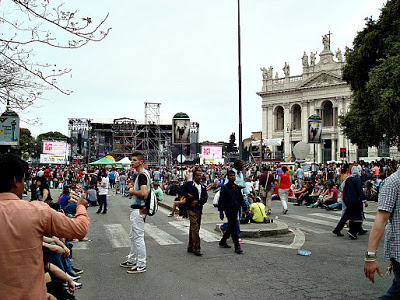
Before the real concert starts, they have already filled up on beer and Coke, leaving the bottles and cans all over the place and running to the (few) public toilets that have been set up:
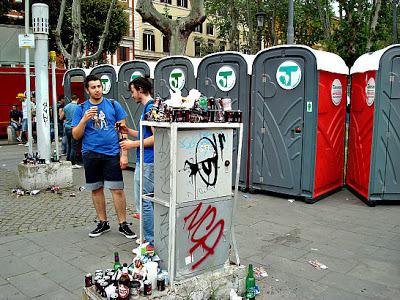
Then the concert opens at 3 pm, with flag waving and screams of delight:

That red flag with Che Guevara? No surprise there, he's never stopped being an icon for the young...Perhaps the bigger surprise is that all these people are not here to protest. The rest of Europe - especially in Greece and Spain - is celebrating May Day with protests against the government and austerity policies that are killing employment.
But not here on Piazza San Giovanni.
Here people sing while unemployment among the young reaches levels of 40 or 50 percent, one out of two is unemployed. Which probably explains why so many young are on this Piazza for the concert. They don't need to wake up early on May 2nd and go to work...
Is it all good, clean fun? Perhaps for those who like that type of loud music that empties your brain of any thought. And it's free, everything is paid for by the trade unions (of course!) and Rome's Mayor Alemanno who is increasingly under attack for the corrupt and inept way he has governed the city in the last few years :
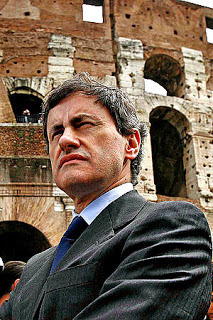
A tough guy issued from the conservative party that has its roots in nostalgia for Mussolini and fascism. He is up for re-election and the concert is a good way for him to get votes. Certainly he doesn't care that the concert is held just a stone's throw away from St. John's Hospital, one of the biggest public hospitals in the city and a historic institution. Hospital patients won't go out and vote, they're stuck in their hospital beds!
On this photo, you can judge for yourself how close St John's hospital is to the Basilica of St John Lateran and therefore to the blaring concert:

The Church is on the left and that lovely classic façade in the background is the hospital.
How do you think hospital patients feel like, being rocked by loud music for 3 days before the concert and then all afternoon and all night long on May First?And how about old residents who cannot move and leave their homes and are forced to listen to that music as if it were played in their bedroom?
Is that a civilized way to celebrate May First?
There is one blogger, a resident in the area, who has done every year his best to draw the attention of the local press and the town authorities to this scandal. Those of you who read Italian will enjoy the irony of his latest blog post, click here . For him, this is an unacceptable violation of a holy Catholic site...
The fact is that no amount of protesting or defending either the Church or the poor hospital patients and residents subjected to this audio-torture moves anyone to do anything to solve the problem - and yet, the solution is simple enough: there is a huge public park in Tor Vergata that was set up for the purpose over 10 years ago.
To no avail.
Everyone thinks it's cool to invade a historic piazza of Rome like San Giovanni, a piazza that cannot sustain the numbers of barbarians who must - they are human after all - relieve themselves after drinking cases of beer while listening to music all night long. In the past music fans brought their own beer cases. This time Heineken has set up a stand:

The city has foreseen very few extra toilets for the 500,000 and more (some say up to a million) music fans that occupy the piazza for hours on end. The day before the concert there were only 6 toilets installed:

That's a jolly nice setting against the old Roman walls, very romantic! But there are only six of them...By May 1st, that had grown to 100, still not enough for all those people.
It's no surprise that due to the lack of public toilets, the surrounding streets serve as urinals:

Italy is in a deep recession, budget deficits are supposed to be reigned in, tax money ought to be used to create jobs rather than play music. On May First, in San Giovanni at least, nobody gives a damn about austerity or job creation. So much better to belt a song and swig a beer!
It's a sign of the times we live in.
My question for you: Do you have any complaint of the kind? I bet you must have suffered from similar, thoughtless impositions on your own personal "free space". Do tell us about it!










The concert generally starts at 3 pm and goes on well past midnight, until 1:30 am, with sound that reverberates so loudly that the statues on top of the Church threaten to fall. But it all starts five days before with the stage being set up in front of the Church, a huge steel construction like a giant Lego:

Then, three days before the concert, every morning and till late in the afternoon, the musicians come in and exercise their talent as loudly as they can, testing the limits of the speakers and the nerves of the residents.
When the big day comes, people start to flock in several hours early and sit everywhere, waiting and drinking:

Before the real concert starts, they have already filled up on beer and Coke, leaving the bottles and cans all over the place and running to the (few) public toilets that have been set up:

Then the concert opens at 3 pm, with flag waving and screams of delight:

That red flag with Che Guevara? No surprise there, he's never stopped being an icon for the young...Perhaps the bigger surprise is that all these people are not here to protest. The rest of Europe - especially in Greece and Spain - is celebrating May Day with protests against the government and austerity policies that are killing employment.
But not here on Piazza San Giovanni.
Here people sing while unemployment among the young reaches levels of 40 or 50 percent, one out of two is unemployed. Which probably explains why so many young are on this Piazza for the concert. They don't need to wake up early on May 2nd and go to work...
Is it all good, clean fun? Perhaps for those who like that type of loud music that empties your brain of any thought. And it's free, everything is paid for by the trade unions (of course!) and Rome's Mayor Alemanno who is increasingly under attack for the corrupt and inept way he has governed the city in the last few years :

A tough guy issued from the conservative party that has its roots in nostalgia for Mussolini and fascism. He is up for re-election and the concert is a good way for him to get votes. Certainly he doesn't care that the concert is held just a stone's throw away from St. John's Hospital, one of the biggest public hospitals in the city and a historic institution. Hospital patients won't go out and vote, they're stuck in their hospital beds!
On this photo, you can judge for yourself how close St John's hospital is to the Basilica of St John Lateran and therefore to the blaring concert:

The Church is on the left and that lovely classic façade in the background is the hospital.
How do you think hospital patients feel like, being rocked by loud music for 3 days before the concert and then all afternoon and all night long on May First?And how about old residents who cannot move and leave their homes and are forced to listen to that music as if it were played in their bedroom?
Is that a civilized way to celebrate May First?
There is one blogger, a resident in the area, who has done every year his best to draw the attention of the local press and the town authorities to this scandal. Those of you who read Italian will enjoy the irony of his latest blog post, click here . For him, this is an unacceptable violation of a holy Catholic site...
The fact is that no amount of protesting or defending either the Church or the poor hospital patients and residents subjected to this audio-torture moves anyone to do anything to solve the problem - and yet, the solution is simple enough: there is a huge public park in Tor Vergata that was set up for the purpose over 10 years ago.
To no avail.
Everyone thinks it's cool to invade a historic piazza of Rome like San Giovanni, a piazza that cannot sustain the numbers of barbarians who must - they are human after all - relieve themselves after drinking cases of beer while listening to music all night long. In the past music fans brought their own beer cases. This time Heineken has set up a stand:

The city has foreseen very few extra toilets for the 500,000 and more (some say up to a million) music fans that occupy the piazza for hours on end. The day before the concert there were only 6 toilets installed:

That's a jolly nice setting against the old Roman walls, very romantic! But there are only six of them...By May 1st, that had grown to 100, still not enough for all those people.
It's no surprise that due to the lack of public toilets, the surrounding streets serve as urinals:

Italy is in a deep recession, budget deficits are supposed to be reigned in, tax money ought to be used to create jobs rather than play music. On May First, in San Giovanni at least, nobody gives a damn about austerity or job creation. So much better to belt a song and swig a beer!
It's a sign of the times we live in.
My question for you: Do you have any complaint of the kind? I bet you must have suffered from similar, thoughtless impositions on your own personal "free space". Do tell us about it!









Published on May 02, 2013 05:59
April 29, 2013
Why Are Traditional Publishers So Angry at Amazon and Indies?
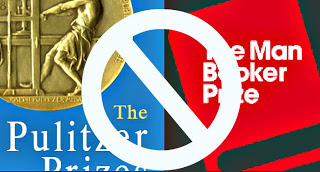
The new digital world of Amazon and self-published authors has provoked surprising hostility among traditional publishers. Amazon is viewed as a threatening gorilla breaking all the rules of the game in the publishing industry. There was a lot of hang-wringing and hair-tearing when it recently bought Goodreads, the biggest online book reading club on the planet with some 16 million members. And traditional agents and editors view self-published authors as little better than self-indulging, worthless vanity press authors.
Is it an "ossified" old man's reaction to technological change?
One may well wonder. Recently author Barry Eisler raised a storm with his article in the Guardian tellingly titled: The Digital Truths Traditional Publishers Don't Want to Hear. Barry Eisler writes thrillers and is one of the new hugely successful "hybrid authors" (i.e. self-published but also published by Amazon and legacy publishers). His article was instantly picked up by the Passive Voice and it provoked some very interesting comments (to read
click here).
As Eisler points out, before November 2007 when Amazon introduced the Kindle, "the only viable means of book distribution was paper... If a writer wanted distribution, she had to pay a publisher 85% of her revenues for the entire publishing package: editorial, copy-editing, proofreading, jacket design, printing, and marketing, all bundled with distribution." This worked wonders for some authors like JK Rowling who made millions, but not for others. With the digital revolution, book distribution became, as he puts it, "a push-button à la carte service offered by companies like
Amazon, Apple, Barnes and Noble, Google, Kobo, and Smashwords".
The digital alternative had arrived and it was grabbed by an increasing numbers of writers: author David Gaughran convincingly argues that some 25% of the total $1.3 billion e-book sales in 2012 is attributable to self-published authors (read his comment on Nathan Bransford fascinating blog post about e-book sales - that are NOT slowing down! - and David's own post here).
Barry Eisler is so articulate that it's always worth reading him and I'm not surprised he's raised a storm among legacy publishers' supporters. In his Guardian article, he recounts how as he was talking about all this at a recent major writers' conference, many in the audience ostensibly walked out, others took to Twitter to urge boycotting him, yet others indulged in name calling - which is both silly and rude. A point that was picked up by the commentators on The Passive Voice who marveled - along with Passive Guy - at this futile desire to kill the messenger.
I would only add one thing: there's one aspect of the process of bringing a book to market that is NOT covered by Barry Eisler. It has to do with the book promotion role of legacy publishers: they are able to do something self-published authors cannot. They do this through their hold and control over major literary prizes (the Pulitzer, the Man Booker etc) which are, as we all know, still closed to indies. Furthermore, they are able to "place" the books they publish in major literary journals and get the attention of major literary critics as well as journalists in the main media like the New York Times, the Guardian and the Wall Street Journal, among others.
That's a powerful tool for book discovery and it is still in the hands of legacy publishers...Will they be able to play this card and regain the lost terrain? Or is Amazon going to pick it up and run with it, the way they've done with Goodreads?
What do you think?
Related articles
 The digital truths traditional publishers don't want to hear(guardian.co.uk)
The digital truths traditional publishers don't want to hear(guardian.co.uk) Lazy Literary Agents In Self-Publishing Money Grab via Argo Navis(davidgaughran.wordpress.com)
Lazy Literary Agents In Self-Publishing Money Grab via Argo Navis(davidgaughran.wordpress.com) Stay up to Date: The Rapidly Changing World of Indie Publishing(vincentstrangecraft.wordpress.com)
Stay up to Date: The Rapidly Changing World of Indie Publishing(vincentstrangecraft.wordpress.com) So, How Clueless Are Traditional Publishers?(nfaa.wordpress.com)
So, How Clueless Are Traditional Publishers?(nfaa.wordpress.com) Amazon Publishing shares some sales numbers in email to agents(nextlevelofnews.com)
Amazon Publishing shares some sales numbers in email to agents(nextlevelofnews.com)








Published on April 29, 2013 23:26
April 28, 2013
A Writers' Chat about Italy: How it Inspires Them
Writers have gone global and their literary muse now travels with
them. It is rare that a writer feels uninspired once he has left his
homeland. As Sunjeev Sahota, one of the twenty "Best Young British Novelists" on the recently published Granta list told the New York Times : "There is a whole generation of people like me who don't have that strong instinctive sense of home". Indeed, more than half of the writers on the Granta list were not born in Britain and come from countries as far flung as Nigeria and China.
When I met Beate Boeker at a writers' retreat, a session of "brainstorming at the spa" in Matera,
in the South of Italy, I knew I had met a nomadic soul mate. Here she is, sitting and chatting with fellow writers in one of Matera's suggestive caves-turned-hotel-and-spa:

The spa, an underground hot water pool (left) and Beate (right)
Beate is from Germany and brought up all over the place, I am from Belgium and equally cosmopolitan, we both function in English. And further, we share something that is still relatively rare: we’re both
published authors in a language we didn’t learn at our mother’s knees,
and, unlike the novelists on the Granta list, neither of us even lives in an English-speaking country. It takes a
certain craziness to persevere with this kind of handicap, but we’re
comfortable with it!
Today, we decided to sit on a virtual sofa together
and share a bit about our lives and our books with you. Here are some of the highlights of that conversation:
Beate: Ever since I met you, I’ve wanted to ask
about your life as a writer and painter in Italy. My (not so secret)
dream is to relocate to the South one day, too! What made you decide to settle in Italy?
Claude: I’ve moved around since I was a baby, including a long time in the United States. Then I got married to the love of
my life . . . a Sicilian. No, he’s not a Mafioso and doesn’t carry a
gun! I’ve lived over 35 years in Italy now.
B: Wow, that’s a lot! Is there anything that grates on you or that you miss in Italy? What do you most love about it?
C: I love Italy’s dolce vita! Do I miss anything? I
guess I miss New York, back in the 1960s. Things like walking into a
Greenwich Village café with my father, late one night, and hearing
Peter, Paul and Mary belting out Lemon Tree, and listening to the jokes
of a scrawny student with thick glasses; he had us in stitches. He was
none other than . . . Woody Allen! But then, don’t we all miss our
youth?
B: I’m not sure. I for one am happier now than with
all the angst back then. Tell me, what do you find that is different about Italians?
C: I don’t see them as anything else but Europeans
with a smile. Nowadays, with the recession, they are a lot less happy
but on the whole, it’s a country where people are in love with life.
B: And compared to Americans?
C: Americans have a “can do” approach to life that
Europeans don’t. Here, people are more cautious, they don’t really
believe that things can be changed and improved.
B: Boy, do I agree with that! This American
approach of “you can make it if you want it” is liberating and so very
un-European. I love that attitude, and I think it can move mountains!
I’ve noticed you’ve started posting political rants on your blog under
the title “our daily burnt bread” – what makes you so angry and does
this anger impact your writing?
C: Many things make me very angry: pollution,
climate change, unemployment, social injustice in general. For a long
time, literature for me was an escape from the world I was living in.
B: I believe literature is an escape for most
people, that’s why I write what I like to call “happy books”! Life is
already difficult enough . . .
C: I agree! That’s definitely the case with my trilogy The Phoenix Heritage : high fantasy! But the setting is Sicily, and in a way,
it’s an evocation of 900 years of Sicilian history through the ghosts
my protagonist meets; they are all historical characters . . . I
dedicated the book to my husband; it is his homeland that inspired me. I
did my research in his family archives and his library of Sicilian
history books.
...Beate, it’s my turn to ask questions. Is writing
for you a form of therapy, an escape from your own reality or a way to
comment on our society and culture?
B: Definitely escapism!
C: Who cannot but notice that you’ve set your books
in Italy even though you’re German and have never lived in Italy. What
draws you to Italy?
B: It’s a mix of the weather (few Germans can
resist sunny climates) and the Italian way of making every detail
beautiful. Italians have that certain flair of paying attention to
detail, and I enjoy that so much. Take the way they stack ice-cream
cones until they look like sprays of a fountain or the colorful paint of
their houses and shutters.
C: Their colorful shutters? I noticed a bright blue
shutter on your latest book, Delayed Death ! But with such a somber
title, how can it be one of your “happy books”?
B: If you don’t count the murder itself, it’s not dark. I would say it’s as happy as a mystery can get!
C: Delayed Death is on top of my to-read list. I
remember reading with great pleasure your Rent-a-Thief novel, that’s a
great title! And it did feature a baby boomer, and you’re a member of
our Boomer Lit Goodreads Group. Do you plan another boomer book or will
you go in a new direction?
B: Oh, my next boomer book is already in the wings.
It’s called Mischief in Italy and starts with a man who tries to tell
his grown son that he should find a better suited woman than the
floozies who only look for his money. I had endless fun with this
romance, and again, it’s set in Italy, at the Lake Garda.
For a full transcript of the chat, go to Beate's website, here.
About Beate Boeker:
She is a traditionally published author since 2008 and now offers many full-length novels and short stories online. Several were shortlisted for the Golden Quill Contest, the National Readers' Choice Award and the 'Best Indie Books of 2012' contest.
She is a marketing manager by day with a degree in International Business Administration, and her daily experience in marketing provides her with fodder for her novels, either hilarious or ironic.While 'Boeker' means 'books' in a German dialect, her first name Beate can be translated as 'Happy'...and with a name that reads 'Happy Books', what else could she do but write novels with happy endings?
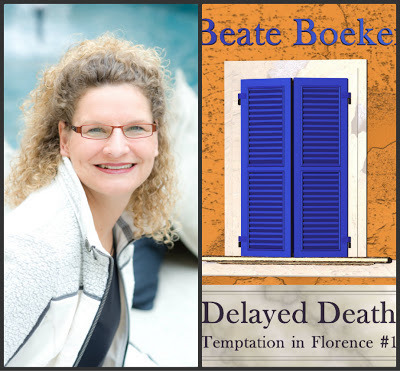
Find Beate on:
Facebook: Beate Boeker Author
Twitter: @BeateBoeker
Author Page on Amazon: here
Link to Delayed Death: click here
Link to Rent a Thief: click here









them. It is rare that a writer feels uninspired once he has left his
homeland. As Sunjeev Sahota, one of the twenty "Best Young British Novelists" on the recently published Granta list told the New York Times : "There is a whole generation of people like me who don't have that strong instinctive sense of home". Indeed, more than half of the writers on the Granta list were not born in Britain and come from countries as far flung as Nigeria and China.
When I met Beate Boeker at a writers' retreat, a session of "brainstorming at the spa" in Matera,
in the South of Italy, I knew I had met a nomadic soul mate. Here she is, sitting and chatting with fellow writers in one of Matera's suggestive caves-turned-hotel-and-spa:

The spa, an underground hot water pool (left) and Beate (right)
Beate is from Germany and brought up all over the place, I am from Belgium and equally cosmopolitan, we both function in English. And further, we share something that is still relatively rare: we’re both
published authors in a language we didn’t learn at our mother’s knees,
and, unlike the novelists on the Granta list, neither of us even lives in an English-speaking country. It takes a
certain craziness to persevere with this kind of handicap, but we’re
comfortable with it!
Today, we decided to sit on a virtual sofa together
and share a bit about our lives and our books with you. Here are some of the highlights of that conversation:
Beate: Ever since I met you, I’ve wanted to ask
about your life as a writer and painter in Italy. My (not so secret)
dream is to relocate to the South one day, too! What made you decide to settle in Italy?
Claude: I’ve moved around since I was a baby, including a long time in the United States. Then I got married to the love of
my life . . . a Sicilian. No, he’s not a Mafioso and doesn’t carry a
gun! I’ve lived over 35 years in Italy now.
B: Wow, that’s a lot! Is there anything that grates on you or that you miss in Italy? What do you most love about it?
C: I love Italy’s dolce vita! Do I miss anything? I
guess I miss New York, back in the 1960s. Things like walking into a
Greenwich Village café with my father, late one night, and hearing
Peter, Paul and Mary belting out Lemon Tree, and listening to the jokes
of a scrawny student with thick glasses; he had us in stitches. He was
none other than . . . Woody Allen! But then, don’t we all miss our
youth?
B: I’m not sure. I for one am happier now than with
all the angst back then. Tell me, what do you find that is different about Italians?
C: I don’t see them as anything else but Europeans
with a smile. Nowadays, with the recession, they are a lot less happy
but on the whole, it’s a country where people are in love with life.
B: And compared to Americans?
C: Americans have a “can do” approach to life that
Europeans don’t. Here, people are more cautious, they don’t really
believe that things can be changed and improved.
B: Boy, do I agree with that! This American
approach of “you can make it if you want it” is liberating and so very
un-European. I love that attitude, and I think it can move mountains!
I’ve noticed you’ve started posting political rants on your blog under
the title “our daily burnt bread” – what makes you so angry and does
this anger impact your writing?
C: Many things make me very angry: pollution,
climate change, unemployment, social injustice in general. For a long
time, literature for me was an escape from the world I was living in.
B: I believe literature is an escape for most
people, that’s why I write what I like to call “happy books”! Life is
already difficult enough . . .
C: I agree! That’s definitely the case with my trilogy The Phoenix Heritage : high fantasy! But the setting is Sicily, and in a way,
it’s an evocation of 900 years of Sicilian history through the ghosts
my protagonist meets; they are all historical characters . . . I
dedicated the book to my husband; it is his homeland that inspired me. I
did my research in his family archives and his library of Sicilian
history books.
...Beate, it’s my turn to ask questions. Is writing
for you a form of therapy, an escape from your own reality or a way to
comment on our society and culture?
B: Definitely escapism!
C: Who cannot but notice that you’ve set your books
in Italy even though you’re German and have never lived in Italy. What
draws you to Italy?
B: It’s a mix of the weather (few Germans can
resist sunny climates) and the Italian way of making every detail
beautiful. Italians have that certain flair of paying attention to
detail, and I enjoy that so much. Take the way they stack ice-cream
cones until they look like sprays of a fountain or the colorful paint of
their houses and shutters.
C: Their colorful shutters? I noticed a bright blue
shutter on your latest book, Delayed Death ! But with such a somber
title, how can it be one of your “happy books”?
B: If you don’t count the murder itself, it’s not dark. I would say it’s as happy as a mystery can get!
C: Delayed Death is on top of my to-read list. I
remember reading with great pleasure your Rent-a-Thief novel, that’s a
great title! And it did feature a baby boomer, and you’re a member of
our Boomer Lit Goodreads Group. Do you plan another boomer book or will
you go in a new direction?
B: Oh, my next boomer book is already in the wings.
It’s called Mischief in Italy and starts with a man who tries to tell
his grown son that he should find a better suited woman than the
floozies who only look for his money. I had endless fun with this
romance, and again, it’s set in Italy, at the Lake Garda.
For a full transcript of the chat, go to Beate's website, here.
About Beate Boeker:
She is a traditionally published author since 2008 and now offers many full-length novels and short stories online. Several were shortlisted for the Golden Quill Contest, the National Readers' Choice Award and the 'Best Indie Books of 2012' contest.
She is a marketing manager by day with a degree in International Business Administration, and her daily experience in marketing provides her with fodder for her novels, either hilarious or ironic.While 'Boeker' means 'books' in a German dialect, her first name Beate can be translated as 'Happy'...and with a name that reads 'Happy Books', what else could she do but write novels with happy endings?

Find Beate on:
Facebook: Beate Boeker Author
Twitter: @BeateBoeker
Author Page on Amazon: here
Link to Delayed Death: click here
Link to Rent a Thief: click here









Published on April 28, 2013 00:02
April 25, 2013
Our Daily Burnt Bread: Is there Anything the US Can Learn from Australia's Gun Laws?
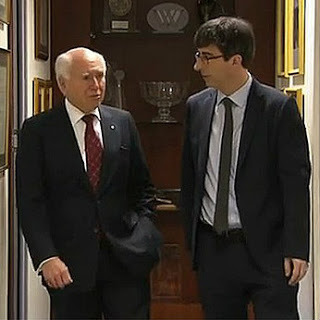
I love this video! Is there nothing America can learn from another country - in this case Australia - that has banned guns 17 years ago and hasn't had a single massacre since?
(video aired on Foxtel's Comedy Channel)
Before the new gun laws came into effect, Australia had experienced nearly one mass killing per year (defined as more than 4 persons dead)...When will the US draw the obvious conclusions?
Or just look at another astounding statistic that sets the debate in perspective: in the past 30 years, America has suffered 3,400 deaths ascribed to terrorism. Compare that to 900,000+ deaths due to gun violence...
PS: this is the second episode - if you want to see the first one where John Oliver interviews former Australian Prime Minister John Howard who successfully introduced gun reforms in Australia, here it is:
Hilarious, whoopty do! Yes, it's satirical, but that's often the best way to hit the truth...
Related articles
 Howard, guns and a TV show(smh.com.au)
Howard, guns and a TV show(smh.com.au) Brilliant Daily Show Segment Shows Exactly Why The US Can't Pass New Gun Laws(businessinsider.com)
Brilliant Daily Show Segment Shows Exactly Why The US Can't Pass New Gun Laws(businessinsider.com) 'Slightly melancholic' John Oliver's Australian visit to air on Foxtel this week(mumbrella.com.au)
'Slightly melancholic' John Oliver's Australian visit to air on Foxtel this week(mumbrella.com.au)








Published on April 25, 2013 08:31
April 23, 2013
Does Blogging Help to Sell Books?
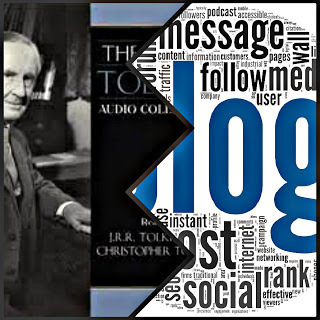
Over the years, I've begun wondering whether blogging sells books. And I'd love to know your opinion, fellow writers and sufferers in this long marketing road to book selling success!
Do you think your blog helps you sell your books? Based on your experience, are
there other better ways to sell books than through a blog and blog
tours? Have you found networking on Facebook, Twitter, Google+, Pinterest, Goodreads and other sites more useful than blogging? In the publishing industry, there is no longer the pressure there once was on writers to set up their own blog if they didn't have one. Is this justified in your opinion?
Before I tell you what I think, take a look at this hilarious video done by author Melissa Conway which renders perfectly the book promotion pains of any indie writer:
So now on to what I have found out after three years of blogging and reaching a decent Alexa ranking (especially for a writer) as I flirt with 1,000 page views/day. I think I can honestly say that the two things - my blog and my book sales - are largely and surprisingly disconnected. I can have a surge of interest in my blog and, disconcertingly, it doesn't reflect in my book sales - and the reverse of course is also true. Because people who read my books don't necessarily flock to my blog...
Why the disconnect? Theories abound (see the related articles below) but I have my own: I think people who read blogs aren't always the same as those who read books. Blog readers are primarily those who like to surf the Net rather than get their news from old-fashioned newspapers actually printed on that white flat surface known as paper. If I'm right about that, then these are people who do not spend any time (if they can help it) reading books, whether they be novels or non-fiction, digital or printed. They've had their daily sup of words, they're satiated, thank you, no books of any kind for them!
Add to that another fact about a blog written by an author: it is inevitably read by a majority of fellow authors. Why? Because the blog tends to deal with matters of interest to other authors (such as this very blog post!). Also it is advertised (largely) through Twitter and followers are likely to be other authors. Certainly my case. I have some 2600 followers on Twitter - I know, it's a modest number but that's not the point. The point is that some 90 percent of my followers are authors like myself. Yet there's nothing strange about this. It's a perfectly normal pattern for Twitter: people who share interests flock together. Same on Facebook. My Facebook Author Page (you can take a look here) has often gathered the "likes" of other authors, over 600 of them. Don't misunderstand me: I'm happy and flattered to have so many fellow authors follow or "like" me, it's definitely a recognition - but it is happening in the rarified world of publishing and literature, not the big world of readers that all of us authors would like to reach out to.
Still, before we drown in self pity, we should all remember that someone like Tolkien who started slow and unknown eventually became the literary giant we all know through the help and support of his fellow historians at Oxford and supportive writers. They were the first to turn his books, The Hobbit and the Lord of the Rings into a cult, they started a wave of popularity that hasn't died down yet.
The only social media site that seems to draw people from very different walks in life is Google+. I suspect that's because (1) it is linked to gmail and (2) it makes "adding" people to "circles" very easy: you have the "acquaintance" category (which means next to nothing), you click that and you're done.
So perhaps Google+ will turn out to be a window on the bigger, larger world of readers?
If you take a look at the articles below, you will see a mix of feelings with some writers expressing great enthusiasm for what is sometimes called "screen selling", arguing that thanks to Internet, they are at last directly connected with their readers. And that is of course true. Indeed, that was from the go, the very premise (or should I say promise) of the digital revolution and online sales. Linking authors directly to their readers: something that had never happened before except at book signing events which are, of necessity, few and far-between, reaching a handful of readers at a time.
So which is right? Does blogging and related SM networking help in spreading the word about books and jump start the famous "book buzz"? Please let me know in your comments, I can't wait to hear your views!
For those who don't feel like expressing in public their opinions, I'm giving the alternative to respond through the poll here, that will keep your privacy complete:
Based on your experience, do you find your blog helps your book sales?
Helps a lot, the blog is indispensable for linking with readers
Helps to some extent, other SM venues like Twitter are more useful
Helps very little though I've been blogging for a long time
Don't know whether it helps, no evidence of link with readers
Other SM venues like Twitter and Facebook are better than blogging
I do not blog, other SM venues like Twitter and Facebook are enough
pollcode.com free polls
Related articles
 Your Book Isn't Selling: What You've Never Been Told(turndogmillionaire.com)
Your Book Isn't Selling: What You've Never Been Told(turndogmillionaire.com) Thursdays with Amanda: Demystifying Amazon's Sales Ranking System(chipmacgregor.com)
Thursdays with Amanda: Demystifying Amazon's Sales Ranking System(chipmacgregor.com) Average price of best-selling e-books on the decline(teleread.com)
Average price of best-selling e-books on the decline(teleread.com) How to Sell 8 Million Books - by Jonathan Gunson(dalefurse.wordpress.com)
How to Sell 8 Million Books - by Jonathan Gunson(dalefurse.wordpress.com) What I Would Do To Sell My Book(thelintinmypocket.wordpress.com)
What I Would Do To Sell My Book(thelintinmypocket.wordpress.com) The Author's Platform....Is it really necessary?(yamulticulturaljunkie.wordpress.com)
The Author's Platform....Is it really necessary?(yamulticulturaljunkie.wordpress.com) Quick Book Selling Fix-Its (For Anytime)(kellielarsenmurphy.com)
Quick Book Selling Fix-Its (For Anytime)(kellielarsenmurphy.com) Book Promotion, Part 2: 51 Tactics to Promote Your Book(rickdacri.wordpress.com)
Book Promotion, Part 2: 51 Tactics to Promote Your Book(rickdacri.wordpress.com) Hand selling books with social media(socialmedia4writers.com)
Hand selling books with social media(socialmedia4writers.com) Publishing & Social Media(novelnook.wordpress.com)
Publishing & Social Media(novelnook.wordpress.com)








Published on April 23, 2013 01:18
April 22, 2013
Our Daily Burnt Bread: The Boston Marathon Bombings vs. the Waco Explosion

All eyes in America have been trained on the Boston Marathon Bombings - three dead, many wounded - and have only barely registered the explosion of the fertilizer plant in Waco, Texas that killed at least 12 people - perhaps more, some say as much as 60 or 70 dead. In short, at least four times as many as in Boston, if not more! A quick search of the Internet yields conflicting news and the final toll is (surprisingly) not yet in.
Do the number of dead not count anymore? Or the spectacular nature of the event? The explosion occurred shortly after a fire had started there and firefighters were on the site clearly not expecting the massive nature of the blast:
It looks like a Hiroshima mushroom cloud, it has the feel of a war zone, you can sense the panic. As bad as in Boston if not worse...
Yet the Boston Marathon bombings occupied the media all week long, with many expecting terrorist organizations to claim responsibility, yet none has (so far). In the end, a police shooting and chase resulted in the news we have all read: a couple of disoriented, angry young men from Chechnya were responsible, the Tsernaev brothers, age 26 and 19. Now the older is dead, the younger is wounded (possibly self-inflicted) and can't speak.
What happened? Are we dealing here with Islamic militants? Were they acting alone? It's too soon to tell, though the modus operandi is clearly home made (a pressure cooker filled with powder) and something anyone can do - just go on Internet, the recipe for such bombs can be found anywhere.
The question that has everyone enthralled and forgetting the Waco explosion is: why.
There are no secrets in the explosion of a fertilizer plant, everyone knows fertilizers are highly explosive - since this is the case, one can only wonder that the fertilizer plant was allowed to be near a nursing home and a school. That is the extent of the scandal here. But in the case of the Tsernaev brothers, our imagination is ignited: after all, Chechnya is one of the world's major flash points for islamic terrorism.
Chechens have been responsible for some of the more atrocious terroristic attacks, taking hostages and killing innocents, scaring the whole of Russia, notably in the Dubrovka theater in Moscow and in a school in Beslan, just to name the better known tragic events we all associate with Chechen terrorists.
Since the Tsernaev brothers are Chechen, there we have it on a platter. The trouble is that we may not be dealing here with standard islamic militants: they did not put on a belt of explosives and walk into a crowd or on a bus, as they do in Israel. No, they went at it in a bumbling, inefficient way. Sure, the police found more explosives at their home so they presumably had more targets in mind and we can only thank God they were stopped before they could do more killing.
To understand what happened, it is not helpful to equate them with terrorist groups, whether Chechen or Arab: we should resist what David Cannadine so aptly calls in his latest book, The Undivided Past: History Beyond Our Differences the "totalizing" temptation. We should stop thinking of History as the story of "us vs. them": we need to resist seeing the two brothers as a part of a larger design, of a so-called "war between Islam and the West".
While it is much too early to come to conclusions, it is clear that we are dealing here with two profoundly misguided young men who had come to America in pursuit of the American Dream only to meet profound disillusion. The Tsernaev brothers took out their frustration and despair on the world around them and did what other young disoriented Americans seem to have done when they went out to shoot people in schools (Columbine, Sandy Hook ) or movie theaters (the Colorado Dark Knight shooting)
The Boston bombings like Beslan? At least one opinion-writer in the New York Times thinks so. Oliver Bullough who knows the Chechen well and is the author of Let Our Fame Be Great: Journeys Among the Defiant People of the Caucasus ends his thoughtful piece with a message I'd like to repeat here: "let us hope that those two toxic varieties of modern violence never meet again".
Indeed, let us hope so.
Could Americans ever be convinced to let go of their love affair with arms? What do you think?
Related articles
 Unluckiest Luckiest Man Survives Both Marathon Bombing and Waco Blast(gawker.com)
Unluckiest Luckiest Man Survives Both Marathon Bombing and Waco Blast(gawker.com) Eyewitness in Waco Confirms Live Drill and Military Presence Prior to Explosion (Photos/Video)(wakinguphumanity.wordpress.com)
Eyewitness in Waco Confirms Live Drill and Military Presence Prior to Explosion (Photos/Video)(wakinguphumanity.wordpress.com) U.S. Corporate Media Blackout On Waco Missile Attack: Corporate "Act Of Terror" Leaves 14 Dead!(politicalvelcraft.org)
U.S. Corporate Media Blackout On Waco Missile Attack: Corporate "Act Of Terror" Leaves 14 Dead!(politicalvelcraft.org) "Boston Bomber's" Former Friends Suspect Him In Triple Murder(buzzfeed.com)
"Boston Bomber's" Former Friends Suspect Him In Triple Murder(buzzfeed.com) FBI Hunting Sleeper Cell(embattledfarmers.wordpress.com)
FBI Hunting Sleeper Cell(embattledfarmers.wordpress.com) Boston bombing: enchaining events(examiner.com)
Boston bombing: enchaining events(examiner.com)








Published on April 22, 2013 08:26



